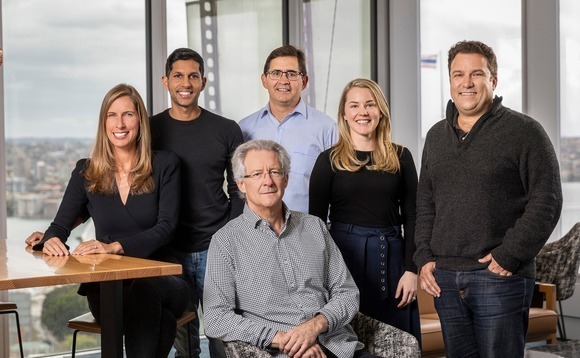
Fund focus: Tidal makes early-stage wave

With $21 million in dry powder, Tidal Ventures wants to bring institutional rigor to Australia's seed stage, helping prepare start-ups for Series A rounds
"You have a bunch of developers sitting around saying there has to be a better way for us to communicate and manage projects together," says Grant McCarthy, a managing partner at Tidal Ventures. "They start signing up to Jira individually using their own credit cards and claiming it back, until such time there were a few thousand of them on the platform and the enterprise turned around and said we need a license."
McCarthy is explaining the "genius of Atlassian" but the likes of Zoom and Slack fit the same model: product-led companies that accumulate customers via word-of-mouth, not through costly sales and marketing efforts. This is also the bedrock of Tidal's strategy – which can now be put to the test with the close of a A$30 million ($21 million) fund.
Tidal wants to bring institutional rigor to the seed stage, helping prepare start-ups for Series A rounds from the likes of Blackbird Ventures, Square Peg Capital, and AirTree Ventures. These local GPs started small and have since raised funds of A$250 million or more. McCarthy doesn't rule out the notion of a later stage vehicle – "We aspire to put a structure around the follow-on opportunities that come out of the seed fund" – but he recognizes there is plenty to do in the seed space.
The first iteration of Tidal began in 2016 when McCarthy, who made his first early-stage investments with Yahoo in Australia in the late 1990s and went on to work in investment banking, launched a fund with Murray Bleach, previously CEO of Macquarie Bank's US operation. They had made about a dozen investments on a deal-by-deal basis and opted for a formal fund to take advantage of Australia's early-stage venture capital limited partnership (ESVCLP) structure.
AddVenture Fund closed at A$10 million and invested in 10 companies, of which four have reached Series A or beyond. PredictHQ, a New Zealand-founded start-up that helps clients predict demand for their services by tracking real-world event data, secured a Series B round earlier this year. Shippit, which handles last-mile delivery for the likes of Coles, is in the process of doing the same.
For McCarthy, part of the challenge was making a seed-stage investment platform sustainable in Australia – as a fund management platform and as a hands-on investor with early-stage businesses. "We had seen it work in the US with the formation of institutional seed funds around the global financial crisis," he says. "First Round Capital, Bolt Ventures and Felicis Ventures have kept their funds tight and specific to seed, raising $100-150 million rather than $500 million to $1 billion."
Two more general partners joined for Fund II. Wendell Keuneman comes from a product management and software engineering background, having previously spent six years at Atlassian. Meanwhile, Andrea Kowalski got to know McCarthy from her time at Bailador Technology Investments, where they were both investors in social marketing platform Stackla. Based in New York, Kowalski helps Tidal portfolio companies penetrate the US market.
Around the same time, the firm dropped the name AddVenture in favor of Tidal, following a case of mistaken identity. When the team backed a local software-as-a-service (SaaS) business specializing in social impact investment, a local journalist attributed the investment to a Russian VC firm known as AddVenture. "The irony of a Russian venture capital fund investing in a small Australian SaaS impact investment platform – it didn't quite align," McCarthy recalls.
Most of the capital in the latest fund came from family offices and high net worth individuals (HNWIs), including some wealth management platforms. These groups are often relatively unfamiliar with the asset class and require some handholding: Tidal's quarterly reports are accompanied by site visits and meetings with founders to get an idea of how early-stage businesses work.
"Many of these family offices have dabbled in the early-stage space, putting money into opportunities presented by angel groups or family networks," McCarthy explains. "Generally, what they say is, ‘We've provided capital, but we have no way of helping the companies.' They are starting to appreciate the need to invest, and from their own experience, they understand the benefit of working with professional managers who can help them learn about it in a structured fashion."
Latest News
Asian GPs slow implementation of ESG policies - survey
Asia-based private equity firms are assigning more dedicated resources to environment, social, and governance (ESG) programmes, but policy changes have slowed in the past 12 months, in part due to concerns raised internally and by LPs, according to a...
Singapore fintech start-up LXA gets $10m seed round
New Enterprise Associates (NEA) has led a USD 10m seed round for Singapore’s LXA, a financial technology start-up launched by a former Asia senior executive at The Blackstone Group.
India's InCred announces $60m round, claims unicorn status
Indian non-bank lender InCred Financial Services said it has received INR 5bn (USD 60m) at a valuation of at least USD 1bn from unnamed investors including “a global private equity fund.”
Insight leads $50m round for Australia's Roller
Insight Partners has led a USD 50m round for Australia’s Roller, a venue management software provider specializing in family fun parks.







